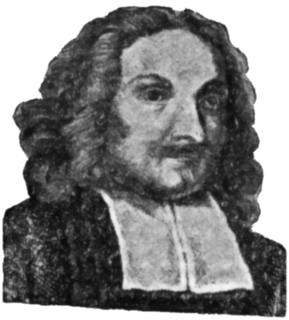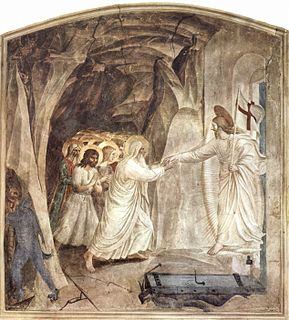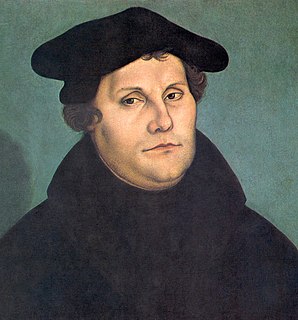Sola Scriptura is a theological doctrine held by some Christian denominations that the Christian scriptures are the sole infallible rule of faith and practice.
A hymn writer is someone who writes the text, music or both of hymns. In the Judeo-Christian tradition the composition of hymns dates back to before the time of David who composed many of the Psalms. The term hymnodist, in the USA more than in other regions, broadens the scope to include the study of hymns.

Reformation Day is a Protestant Christian religious holiday celebrated on 31 October, alongside All Hallows' Eve (Halloween) during the triduum of Allhallowtide, in remembrance of the onset of the Reformation.

Laurentius Petri Nericius was a Swedish clergyman and the first Evangelical Lutheran Archbishop of Sweden. He and his brother Olaus Petri are, together with the King Gustav Vasa, regarded as the main Lutheran reformers of Sweden. They are commemorated by the Evangelical Lutheran Church in America on April 19.

Olof Persson, sometimes Petersson, better known under the Latin form of his name, Olaus Petri, was a clergyman, writer, judge and major contributor to the Protestant Reformation in Sweden. His brother, Laurentius Petri, became the first Evangelical Lutheran Archbishop of Sweden.

In Christian theology, justification is God's act of removing the guilt and penalty of sin while at the same time making a sinner righteous through Christ's atoning sacrifice.

"A Mighty Fortress Is Our God" is one of the best known hymns by the reformer Martin Luther, a prolific hymnodist. Luther wrote the words and composed the melody sometime between 1527 and 1529. It has been translated into English at least seventy times and also into many other languages. The words are a paraphrase of Psalm 46.

Katharina von Bora, after her wedding Katharina Luther, also referred to as "die Lutherin", was the wife of Martin Luther, German reformer and a seminal figure of the Protestant Reformation. Beyond what is found in the writings of Luther and some of his contemporaries, little is known about her. Despite this, Katharina is often considered one of the most important participants in the Reformation because of her role in helping to define Protestant family life and setting the tone for clergy marriages.

Justus Jonas, the Elder, or simply Justus Jonas, was a German Lutheran theologian and reformer. He was a Jurist, Professor and Hymn writer. He is best known for his translations of the writings of Martin Luther and Philipp Melanchthon. He accompanied Martin Luther in his final moments.

On the Jews and Their Lies is a 65,000-word antisemitic treatise written in 1543 by the German Reformation leader Martin Luther.

The Lutheran Calendar of Saints is a listing which specifies the primary annual festivals and events that are celebrated liturgically by some Lutheran Churches in the United States. The calendars of the Evangelical Lutheran Church in America (ELCA) and the Lutheran Church–Missouri Synod (LCMS) are from the 1978 Lutheran Book of Worship and the 1982 Lutheran Worship. Elements unique to the ELCA have been updated from the Lutheran Book of Worship to reflect changes resulting from the publication of Evangelical Lutheran Worship in 2006. The elements of the calendar unique to the LCMS have also been updated from Lutheran Worship and the Lutheran Book of Worship to reflect the 2006 publication of the Lutheran Service Book.

The term "saint" is a context-specific translation of the Latin "sanctus", meaning sacred, and originally referred to a sacred person—however, since the 10th century, the Church has reserved the status of saint to people its official canon law has recognised for outstanding Christian service and conduct. When the Church of England was in union with Rome, saints arose in the form of canonisation. Those martyrs and confessors recognised before the 10th century and since the break with Rome in the 16th century are generally still considered both "saints" and "Saints". "Hero/heroine" are sometimes used to refer to those holy people whom the church synod or an individual church praises as having had special benevolence who have lived and died since the split with Rome. It considers such muted terms a reversion to a more simple and cautious doctrine which emphasises empowerment (subsidiarity) to all members and components of the church.

Lutheranism as a religious movement originated in the early 16th century Holy Roman Empire as an attempt to reform the Roman Catholic Church. The movement originated with the call for a public debate regarding several issues within the Catholic Church by Martin Luther, then a professor of Bible at the young University of Wittenberg. Lutheranism soon became a wider religious and political movement within the Holy Roman Empire owing to support from key electors and the widespread adoption of the printing press. This movement soon spread throughout northern Europe and became the driving force behind the wider Protestant Reformation. Today, Lutheranism has spread from Europe to all six populated continents.

Renewer of Society is a title given by the Lutheran Book of Worship to selected individuals commemorated in its Calendar of Saints whom it sees as having contributed dramatically to the development and vitality of society. The individuals specifically designated by one or more Lutheran churches with this term include:

The Lutheran liturgical calendar is a listing which details the primary annual festivals and events that are celebrated liturgically by various Lutheran churches. The calendars of the Evangelical Lutheran Church in America (ELCA) and the Evangelical Lutheran Church in Canada (ELCIC) are from the 1978 Lutheran Book of Worship and the calendar of Lutheran Church–Missouri Synod (LCMS) and the Lutheran Church - Canada use the Lutheran Book of Worship and the 1982 Lutheran Worship. Elements unique to the ELCA have been updated from the Lutheran Book of Worship to reflect changes resulting from the publication of Evangelical Lutheran Worship in 2006. The elements of the calendar unique to the LCMS have also been updated from Lutheran Worship and the Lutheran Book of Worship to reflect the 2006 publication of the Lutheran Service Book.

Lutheranism is a major branch of Western Christianity that identifies with the teaching of Martin Luther, a 16th century German reformer. Luther's efforts to reform the theology and practice of the church launched the Protestant Reformation. The reaction of the government and church authorities to the international spread of his writings, beginning with the 95 Theses, divided Western Christianity.

Protestantism is the second largest form of Christianity with collectively between 800 million and more than 900 million adherents worldwide or nearly 40% of all Christians. It originated with the 16th century Reformation, a movement against what its followers perceived to be errors in the Roman Catholic Church. Protestants reject the Roman Catholic doctrine of papal supremacy and sacraments, but disagree among themselves regarding the real presence of Christ in the Eucharist. They emphasize the priesthood of all believers, justification by faith alone rather than by good works, and the highest authority of the Bible alone in faith and morals. The "five solae" summarise basic theological differences in opposition to the Roman Catholic Church.

Johann, known as Johann the Steadfast or Johann the Constant, was Elector of Saxony from 1525 until 1532 from the House of Wettin.
Events in the year 1962 in Germany.













